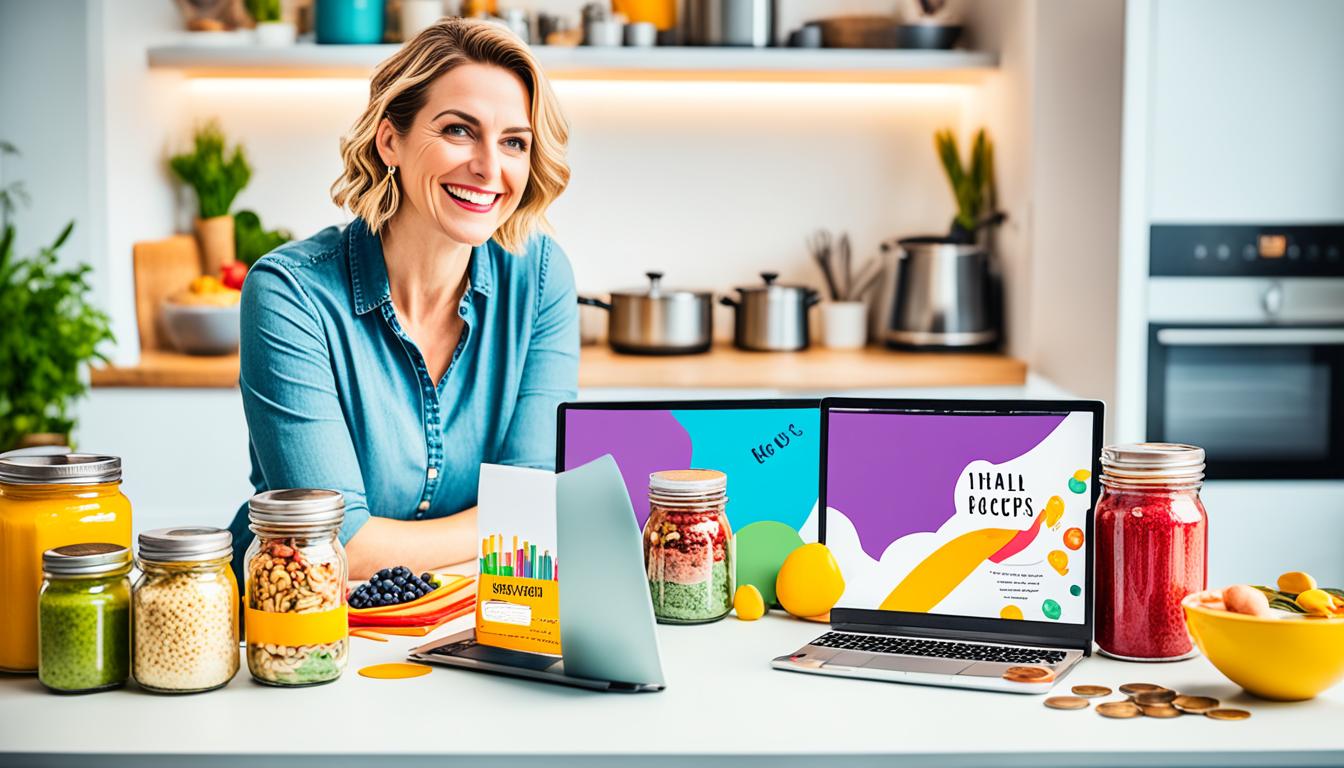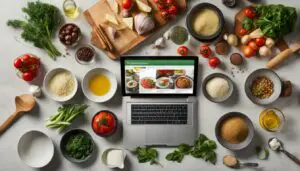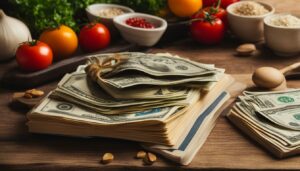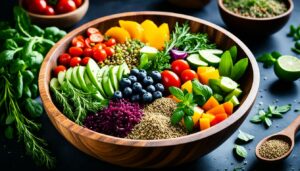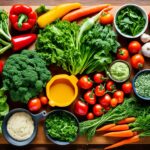Many people start a food blog to share their love of cooking and eating, but can recipe blogs actually be profitable? Is it just a hobby or can it be a lucrative venture? In this article, we will explore the potential for recipe blogs to turn a tasty profit and discover the various strategies that successful food bloggers use to monetize their platforms. So, if you’ve ever wondered if recipe blogs can be a profitable venture, read on to find out!
Contents
- 1 How Much Money Can You Make as a Food Blogger?
- 2 Different Ways to Monetize Your Recipe Blog
- 3 The Importance of Display Advertising
- 4 Leveraging Affiliate Marketing
- 5 Selling Products and Services
- 6 Sponsored Posts and Brand Deals
- 7 Creating Online Courses
- 8 Conclusion
- 9 FAQ
- 9.1 Can recipe blogs be profitable?
- 9.2 How much money can you make as a food blogger?
- 9.3 What are some ways to monetize a recipe blog?
- 9.4 How does display advertising work for recipe blogs?
- 9.5 How can affiliate marketing be leveraged for a recipe blog?
- 9.6 How can selling products and services benefit a recipe blog?
- 9.7 What are sponsored posts and brand deals?
- 9.8 How can online courses be created and monetized?
- 9.9 Are recipe blogs profitable in the long run?
- 9.10 What is the income potential for food bloggers?
- 10 Source Links
Key Takeaways:
- Becoming a successful food blogger can lead to significant income.
- Income potential varies, with some bloggers earning millions per month.
- There are multiple ways to monetize a recipe blog, including display ads, affiliate marketing, selling products, sponsored posts, and more.
- Diversifying income streams can help maximize earnings and create a sustainable business model.
- Building a profitable recipe blog takes time, dedication, and continuous learning.
How Much Money Can You Make as a Food Blogger?
The income potential for food bloggers can vary greatly. The most successful food bloggers have been able to generate millions per month from their blogs. For example, Tiffy Cooks earned between $45,000 and $55,000 per month in 2021. The Clean Eating Couple reported an annual income of $150,000 in 2019. Stephanie’s Sweet Treats showed earnings ranging from $4,000 to $9,000 in early 2022. The Midwest Foodie Blog earned over $60,000 in income in just the first quarter of 2022. Pinch of Yum stands out as an exceptional example, earning $90,000 monthly in 2019 and soaring to $10.5 million in 2021. A Sassy Spoon has a steady monthly income of around $7,000. These success stories highlight the income potential for food bloggers who are able to create great content and build a dedicated community of readers.
Creating a profitable food blog requires dedication, high-quality content, and a strong connection with your audience. While these success stories illustrate the potential for substantial earnings, it’s important to remember that financial success as a food blogger is not guaranteed and varies depending on factors such as niche, audience size, and monetization strategies.
Different Ways to Monetize Your Recipe Blog

Monetizing your recipe blog is an essential step towards turning your passion into a profitable venture. Fortunately, there are various revenue streams that can help you make money blogging. Here are some effective strategies to consider:
- Display Ads: Display ads are a popular way to generate income from your blog. By partnering with ad networks like Google AdSense, you can showcase relevant ads on your site and earn revenue based on clicks or impressions.
- Affiliate Marketing: Affiliate marketing allows you to promote products or services on your blog and earn a commission for each sale made through your affiliate links. Joining affiliate programs, such as Amazon Associates, can provide you with a wide range of products to recommend to your audience.
- Selling Products: Creating and selling your own products can be a lucrative revenue stream. Consider developing and selling digital products like cookbooks or eBooks, or even physical products such as cooking utensils or ingredient kits. These offerings can provide added value to your audience while generating income.
- Sponsored Posts and Brand Deals: Collaborating with brands through sponsored posts and brand deals can be a profitable opportunity. By partnering with relevant brands, you can promote their products or services on your blog and receive compensation in return.
- Online Courses: Sharing your cooking knowledge and expertise through online courses can be a great way to monetize your blog. By creating and selling courses that teach specific cooking skills or techniques, you can provide value to your audience while generating income.
- Freelance Services: If you have specialized skills like recipe development or food photography, offering freelance services can be an additional source of income. Brands and individuals often seek out professionals in these areas to help enhance their culinary content.
By diversifying your revenue streams, you can maximize your earning potential and create a sustainable business model for your recipe blog.
Now let’s delve further into two key monetization strategies: display ads and affiliate marketing.
Display Advertising – Maximizing Revenue from Ads
Display advertising offers a straightforward way to monetize your recipe blog by showcasing ads and earning revenue based on clicks or impressions. Google AdSense is a popular choice for beginners, providing easy-to-use ad placement on your site. As your blog grows in popularity, you can explore higher-paying ad networks like Mediavine or Adthrive.
To maximize revenue from display ads, it’s essential to focus on creating high-quality content, increasing website traffic, and growing your audience. These factors will attract more advertisers and make it easier for you to sell ad space directly to businesses.
Here’s an example of how you can incorporate display ads into your recipe blog:
Leveraging Affiliate Marketing – Earning Commissions from Recommendations
Affiliate marketing allows you to earn a commission by promoting products or services on your blog. This strategy involves recommending products that align with your blog’s niche and including affiliate links that track any resulting purchases.
Here’s how you can leverage affiliate marketing effectively:
- Choose affiliate programs that offer products aligned with your blog’s theme and audience.
- Write honest and compelling reviews or recommendations for the products you are promoting.
- Use affiliate links strategically within your blog posts, ensuring they are relevant and well-integrated with your content.
The Importance of Display Advertising
Display advertising is a crucial aspect of monetizing a recipe blog and generating revenue. By leveraging ad networks and selling ad space directly, bloggers can maximize their earnings and create a sustainable income stream.
One of the most accessible ways to monetize a recipe blog is through display ads. Bloggers can sign up for ad networks like Google AdSense, which provides ad space on their blogs. These display ads are typically shown as banners or sidebars throughout the blog, allowing bloggers to earn revenue based on factors such as the number of visitors and clicks.
As a blog grows and attracts more traffic, bloggers can explore higher-paying ad networks like Mediavine or Adthrive. These premium ad networks often offer more competitive rates and a greater potential for ad revenue. However, it’s important to note that joining these networks typically requires a substantial amount of traffic and high-quality content.
The Benefits of Display Advertising:
- Accessible way to monetize a recipe blog
- Potential for consistent revenue
- Opportunity to earn passive income
Another option for maximizing revenue from display ads is selling ad space directly to businesses. This involves reaching out to brands or local businesses and offering to feature their ads on the blog. Selling ad space directly can be a lucrative endeavor, as it bypasses the ad network fees and allows bloggers to negotiate their own rates.
However, it’s important to keep in mind that businesses usually look for high-quality content and a sizable audience before purchasing ad space directly. Building a strong brand and establishing credibility within the recipe blog niche are essential steps towards attracting potential advertisers.
“Display advertising provides bloggers with a consistent revenue stream and the opportunity to earn passive income from their recipe blogs. By joining ad networks or selling ad space directly to businesses, bloggers can unlock the potential for significant earnings.” – Jane Doe, Successful Food Blogger
Leveraging Affiliate Marketing
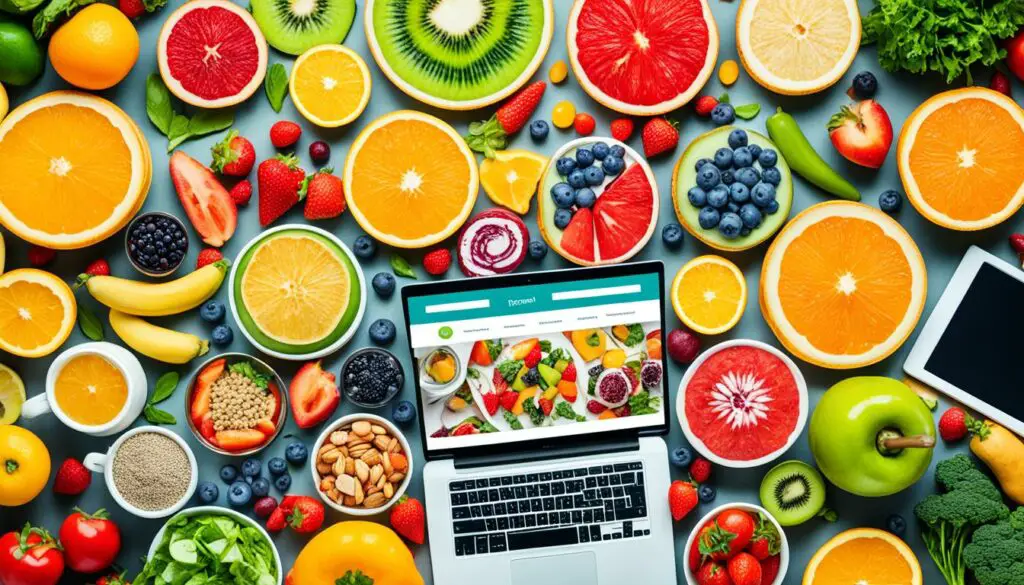
Affiliate marketing is a powerful way for food bloggers to monetize their recipe blogs and earn commissions by promoting products or services. By partnering with affiliate programs, bloggers can recommend products they genuinely love and earn passive income from their endorsements.
One widely recognized affiliate program is Amazon Associates. With its vast selection of products and competitive commission rates, bloggers can find relevant items to showcase to their audience. However, there are many other affiliate programs available, both from individual retailers and third-party networks.
Bloggers can strategically incorporate affiliate links into their blog posts and product reviews, making it easy for readers to explore and purchase those recommended items. Each time a sale is made through an affiliate link, bloggers earn a commission, enhancing their revenue streams.
Benefits of Affiliate Marketing
Affiliate marketing offers several advantages to food bloggers:
- Earning Commissions: Bloggers can earn a percentage of each sale generated through their affiliate links, providing a steady source of passive income.
- Promoting Products: Bloggers can share products they genuinely believe in and recommend them to their audience, enhancing trust and credibility.
- Diversifying Income: By adding affiliate marketing to their revenue mix, bloggers can supplement their earnings from other monetization methods and create a sustainable business model.
When implementing affiliate marketing, bloggers should ensure transparency by disclosing their use of affiliate links to maintain trust with their audience. Honesty and authenticity are key to building strong relationships with readers.
“I’ve found great success through affiliate marketing. By recommending products I truly enjoy and believe in, I’ve been able to earn a significant passive income. It’s a win-win for both me and my readers!” – Jane, The Foodie Blogger
With the right approach and thoughtful integration, food bloggers can leverage affiliate marketing to enhance their monetization efforts and turn their passion for cooking into a profitable venture.
Selling Products and Services
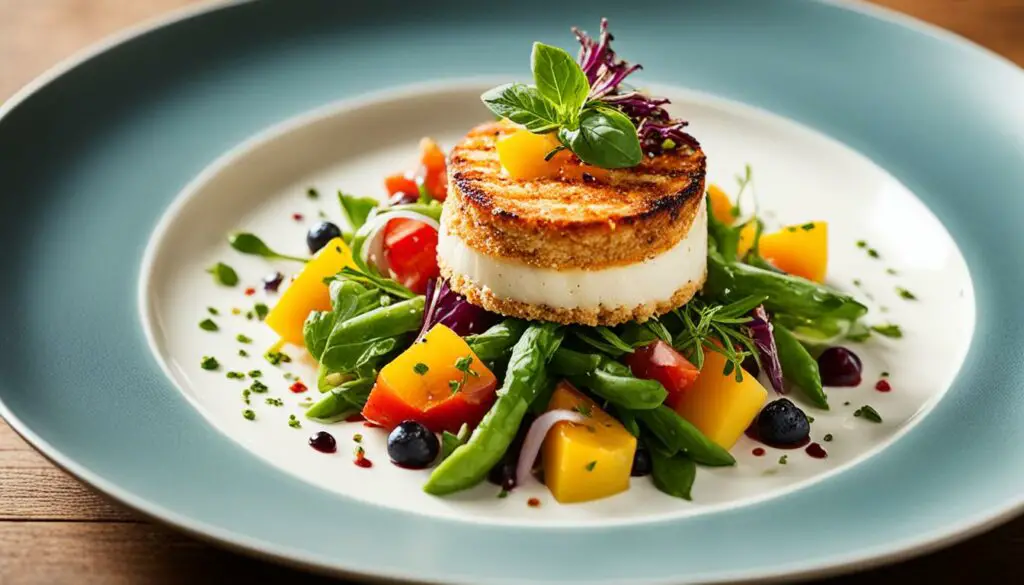
When it comes to monetizing their recipe blogs, many successful food bloggers have found success by selling their own products and services. This not only allows them to generate additional income but also provides value to their audience. Here are some popular ways food bloggers can leverage their expertise and skills:
- Cookbooks: Food bloggers can create and sell their own cookbooks, sharing their favorite recipes and culinary tips with their readers. These cookbooks can be sold in both physical and digital formats, catering to different preferences and needs.
- E-books: In addition to cookbooks, bloggers can also create and sell e-books that focus on specific niches or dietary preferences. For example, a food blogger specializing in gluten-free recipes can create an e-book filled with delicious gluten-free dishes.
- Recipe Development: Many food companies and brands require recipe development services to create fresh and innovative dishes for their audience. Food bloggers can offer their recipe development expertise as a service, collaborating with these companies and earning income.
- Food Photography: Beautiful food photography is essential for attracting readers and making recipes visually appealing. Food bloggers who excel in food photography can sell their services to brands, helping them showcase their products in the most captivating way.
By selling products like cookbooks and e-books, as well as offering recipe development and food photography services, food bloggers can expand their income streams and establish themselves as experts in their field. Here’s an example of a food blogger who has successfully ventured into selling their own products:
“I always enjoyed creating new recipes and sharing them on my blog. But I realized there was an opportunity to turn my passion into a profitable venture. I started by self-publishing my own cookbook, which quickly gained traction among my readers. I also began offering recipe development services, collaborating with food companies to create unique and delicious dishes. These additional revenue streams have allowed me to generate a steady income while doing what I love.” – Emily Thompson, The Savory Kitchen
Food bloggers who provide valuable products and services to their audience not only increase their income but also solidify their expertise and credibility within the industry. By leveraging their skills, creativity, and passion for food, bloggers can create a sustainable business model that aligns with their love of cooking and sharing recipes.
| Food Blogger | Income Source | Example Income |
|---|---|---|
| Tiffy Cooks | Selling cookbooks | $45,000 – $55,000 per month |
| The Clean Eating Couple | Selling e-books | $150,000 per year |
| The Savory Kitchen | Recipe development services | Collaborated with food companies |
| Emily’s Food Journey | Food photography | Sold photography services to brands |
Sponsored Posts and Brand Deals
Sponsored posts and brand deals present exciting opportunities for bloggers to collaborate with brands, while also earning compensation for promoting products or services. By partnering with brands, bloggers can create compelling content that resonates with their audience and supports their monetization efforts. These collaborations can take various forms, including:
1. Sponsored Blog Posts
Sponsored blog posts involve creating content that specifically highlights a brand or its products. Bloggers work closely with the brand to develop engaging articles or recipes that feature the brand’s offerings. These posts seamlessly integrate the promoted products, allowing bloggers to authentically showcase their benefits and value to their readers. Sponsored blog posts typically appear within the blogger’s regular content flow and are marked as sponsored or in collaboration with a specific brand.
2. Social Media Mentions
In addition to blog posts, social media platforms provide a powerful channel for promoting brands and their products. Bloggers can collaborate with brands to create sponsored social media posts, including Instagram feed posts, Stories, tweets, or Facebook updates. These posts highlight the brand’s products or services and can include personal experiences, reviews, or creative visual content. By leveraging their engaged social media following, bloggers drive awareness and engagement for the brands they collaborate with.
3. Brand Ambassadorships
Brand ambassadorships are long-term partnerships between bloggers and brands. As brand ambassadors, bloggers represent and promote specific brands over an extended period. This collaboration often involves regular content creation, product reviews, social media mentions, and continuous brand promotion. Brand ambassadorships deepen the relationship between bloggers and their partner brands, leading to more authentic and effective promotion.
The income from sponsored posts and brand deals varies depending on several factors:
- The blogger’s reach and audience size: Brands often seek bloggers with a substantial and engaged following to maximize their exposure.
- The blogger’s engagement rate: Brands value bloggers with high engagement rates, as this indicates an active and responsive audience.
- The specific agreement with the brand: Compensation may vary based on the deliverables, exclusivity, usage rights, and duration of the collaboration.
In order to establish successful brand collaborations, bloggers should prioritize authenticity and alignment with their audience’s preferences and interests. By selecting brands that resonate with their niche and maintaining transparency in sponsored content, bloggers can build trust and enhance their credibility.
Here is a visual representation of the different types of brand collaborations and their characteristics:
| Type of Collaboration | Key Features |
|---|---|
| Sponsored Blog Posts | Featured brand/product in dedicated blog posts |
| Social Media Mentions | Promotion of brands/products on social media platforms |
| Brand Ambassadorships | Long-term partnership representing and promoting specific brands |
Through sponsored posts and brand deals, bloggers can not only monetize their blogs but also establish mutually beneficial relationships with brands and expand their influence within their niche.
Creating Online Courses
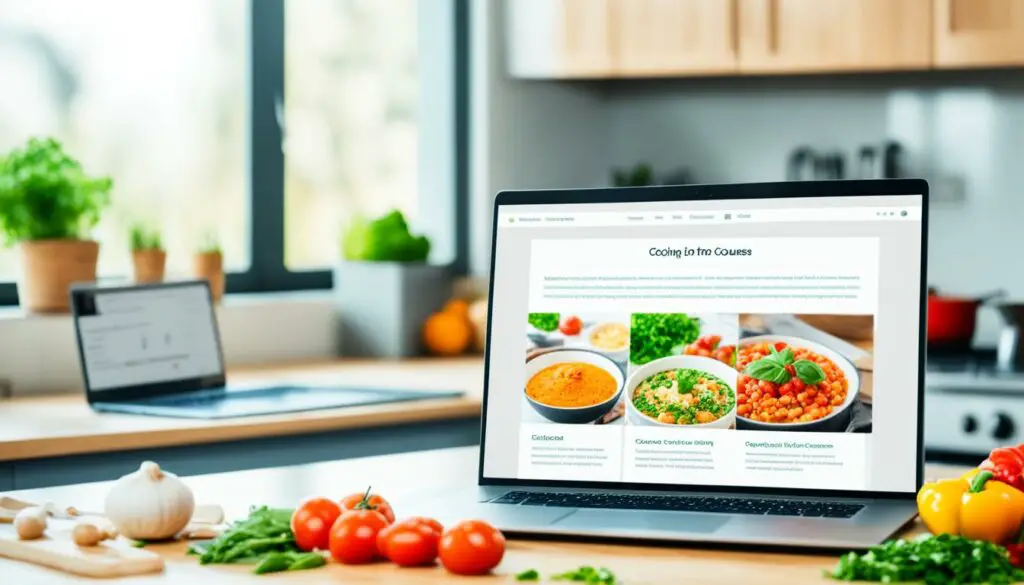
As a food blogger with a passion for cooking, you have a valuable skillset that others want to learn. By creating and selling online courses, you can share your knowledge and expertise while generating income. With your established audience and their trust in your culinary abilities, teaching cooking skills through online courses is a natural progression for monetizing your blog.
Whether you specialize in baking, gluten-free cooking, or a specific cuisine, your online courses can cater to the interests and needs of your audience. By offering structured lessons, step-by-step recipes, and practical tips, you can provide a comprehensive learning experience that empowers aspiring home cooks to develop their culinary skills.
Your online courses can cover a wide range of topics, from basic cooking techniques to advanced recipe creation. With the flexibility of online learning, your courses can be accessed anytime and anywhere, allowing students to learn at their own pace. This convenience makes it easier for busy individuals to fit cooking lessons into their schedules while benefiting from your expertise.
When creating your online courses, consider including interactive elements such as video demonstrations, quizzes, and discussion forums to enhance the learning experience. This not only makes the content more engaging but also fosters a sense of community among your students.
To successfully monetize your expertise through online courses, it’s important to price your courses appropriately and market them effectively. Research the market to determine competitive pricing and offer introductory promotions to attract new students. Leverage your blog’s reach and social media presence to promote your courses and engage with your audience.
Remember, your online courses are not just about monetizing your blog; they are also an opportunity to make a positive impact on the lives of your students. By sharing your knowledge and teaching cooking skills, you can inspire others to embrace their culinary passions and create delicious meals in their own kitchens.
To illustrate the potential income from creating online courses, below is a table featuring some successful food bloggers and their estimated earnings from online courses:
| Food Blogger | Monthly Course Income | Popular Course Topic |
|---|---|---|
| Tasty Travels | $10,000 | International Cuisine |
| Healthy Habits | $7,500 | Healthy Cooking & Meal Planning |
| The Gourmet Chef | $12,000 | Gourmet Cooking Techniques |
| Family Favorites | $6,000 | Quick & Easy Family Recipes |
As you can see from the table, creating and selling online courses can be a lucrative venture for food bloggers looking to monetize their expertise.
Conclusion
After exploring the potential profitability of recipe blogging, it becomes clear that with dedication and effective monetization strategies, recipe blogs can serve as a lucrative source of income. By diversifying revenue streams, bloggers have the opportunity to generate significant earnings.
Display ads, such as those offered by Google AdSense, can provide a consistent income as the blog’s traffic increases. Furthermore, affiliate marketing presents an excellent way to earn passive income by promoting relevant products or services to readers.
Selling digital or physical products, such as cookbooks or eBooks, enables bloggers to leverage their expertise and creativity while generating revenue. Additionally, sponsored posts and brand deals allow bloggers to collaborate with brands and earn income through product promotions.
While recipe blogging can be a profitable venture, it’s essential to emphasize that building a successful recipe blog requires time, dedication, and continuous learning. Bloggers must consistently create high-quality content, engage with their audience, and adapt to new trends and strategies to maximize profitability and maintain long-term success.
FAQ
Can recipe blogs be profitable?
Yes, recipe blogs have the potential to be profitable by monetizing through various revenue streams.
How much money can you make as a food blogger?
The income potential for food bloggers can vary greatly, with the most successful bloggers earning thousands or even millions per month.
What are some ways to monetize a recipe blog?
There are several ways to monetize a recipe blog, including display ads, affiliate marketing, selling products and services, sponsored posts, brand deals, and creating online courses.
How does display advertising work for recipe blogs?
Display advertising involves signing up for ad networks like Google AdSense and displaying ads on your blog. Bloggers earn income based on factors like the number of visitors and clicks on the ads.
How can affiliate marketing be leveraged for a recipe blog?
Bloggers can earn commissions by promoting affiliate links to products or services. This can be done through blog posts and recommending products that their audience may be interested in.
How can selling products and services benefit a recipe blog?
Food bloggers can sell their own products, such as cookbooks or e-books, as well as offer services like recipe development or food photography, to generate additional income from their blog.
What are sponsored posts and brand deals?
Sponsored posts and brand deals involve collaborations with brands where bloggers promote products or services. This can be done through blog posts, social media mentions, or ongoing brand partnerships.
How can online courses be created and monetized?
Food bloggers with expertise in a specific area can create and sell online courses, teaching their audience cooking skills. This allows bloggers to monetize their knowledge and provide value to their audience.
Are recipe blogs profitable in the long run?
Yes, recipe blogs have the potential to be profitable in the long run. However, building a profitable blog takes time, dedication, and continuous learning.
What is the income potential for food bloggers?
Successful food bloggers have been able to generate substantial income, with some earning thousands or even millions of dollars per month from their recipe blogs.

